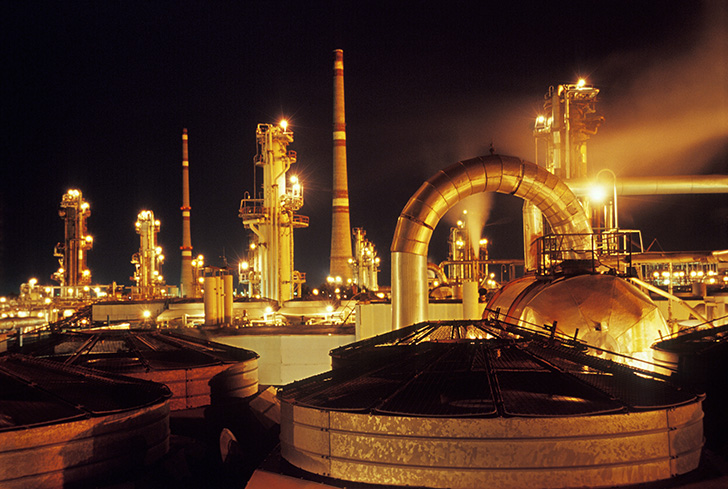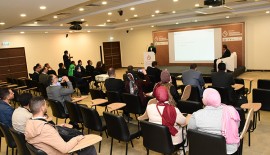By Mahinaz El Baz
The petrochemical industry plays an important role in the Egyptian economy and is one of the most dynamic parts of the oil and gas sector. Recognizing the importance of the industry, the Egyptian government has developed and is implementing a master plan to accelerate its growth, but, despite significant expansion, the industry still faces many obstacles that hinder its ability to achieve its full potential.
Economic Contribution
There are few industries that do not—in one way or another—use petrochemical products. The industry has also begun to create new products that not only compete with but also surpass traditional materials. With such a central role, the petrochemical industry serves as an essential component of an economy’s industrial backbone.
Egypt’s petrochemical industry will benefit from the country’s resource endowment and domestic market. According to the United Nations Industrial Development Organization (UNIDO), domestic demand for petrochemical products is increasing in Egypt. This demand for will continue to increase at a brisk pace for the foreseeable future due to economic and population growth.
To meet that demand, Egypt will need to pump additional capital into the refining and manufacturing sector to increase capacity. With population of over 90 million and growing domestic demand, Egypt’s domestic consumption of petrochemical products is expected to increase in the coming years. “Egypt has a potential huge market that can absorb and consume petrochemical products when produced locally. For foreign investors, this can secure a great percentage of their products off take, hence increasing their market shares,” said Sara Mortada, Business Development Department Head at the Egyptian Petrochemicals Holding Company (ECHEM).
Production of petrochemical and derivative products reached 35.5 million tons during fiscal year (FY) 2016/2017—up from 31.2 million tons during FY 2015/2016—according to Amwal Al Ghad. This production rate represented an increase of over 30% from the previous year’s production and was accompanied by sales nearly 20% higher, according to ECHEM’s annual report.
Moreover, the Egyptian oil and gas sector is aiming to boost the production of petrochemical products to 40 million tons during FY 2017/2018 to meet the growing demand, sources at ECHEM told Amwal Al Ghad.
The industry contributes 3% of the country’s GDP and 12% of the local hydrocarbon industry as a whole. In 2014, Egypt consumed 2.22 million tons of plastic and rubber, an annual rate of 25 kilogram per citizen, according to the General Authority for Investment and Free Zones (GAFI).
In addition, Egypt supplies petrochemical products to about 50 countries worldwide. With its strategic location and large domestic market, the country is well positioned for business. “Egypt is gifted with its distinct location, which facilitates product export to global markets, such as Asia, Europe, and Africa,” noted Mortada. A more level playing field could spur the growth of small- and medium-sized businesses. These businesses, according to a World Bank study, contribute only 20% of the Middle East and North Africa (MENA) region’s domestic production but employ 70-80% of its workforce. Growth among these small- and medium-sized businesses could create tens of millions of new jobs, with 65% of its 355 million people under the age of 25, will need in the next decade to avoid social disaster, according to ECHEM’s annual report. Mortada considers this young, competent, and technologically adept workforce one of Egypt’s assets.
Attracting Extra Investments
The Egyptian Ministry of Petroleum and Mineral Resources considers the petrochemical industry a priority and hopes to garner $20 billion worth of investments in it. Several factors are key to attracting foreign direct investment (FDI), such as the availability of raw materials, a talented workforce, and strong communication channels with investors. According to Amr El Shikh, a petrochemical engineer, Egypt has all these prerequisite factors for FDI.
Egypt’s petroleum sector includes eight large petrochemicals projects with investments worth almost $7 billion and a total capacity of about 4.5 million tons per year, according to a September 2016 report by Plastics News Europe. The projects are located in four regions: Port Said, Suez, Damietta, and Alexandria.
“There are main factors determining the Foreign Direct Investment (FDI) flow, such as political and economic stability,” according to a petrochemical expert who requested to remain unnamed. He also noted that “Egypt’s strong and trusted banking system is also a main factor in attracting FDI in the petrochemicals industry, as the foreign share of any project is managed by Egypt’s public banks.”
Echoing this theme, Mortada stated that, “recent reforms of the Egyptian gas market and the issuance of the new gas market regulating law would encourage investments in Egypt as well. [In addition, the] current status of the Egyptian pound highly attracts more foreign investments in Egypt.”
In August 2016, Egypt’s downstream sector set a new milestone with the inauguration of the petrochemical complex of the Egyptian Ethylene & Derivatives Company (Ethydco). The complex has the capacity to produce 480,000 tons of ethylene annually . Other projects are currently in the works. The Tahrir Petrochemicals Complex is set to become Egypt’s largest petrochemical complex. This five-million-square-meter complex is being built in Ein Sokhna, close to Suez, and is expected to begin production in 2019. When complete, it will produce 1.35 million tons of polyethylene per year, 880,000 million tons of propylene, 250,000 million tons of butadiene, 350,000 million tons of benzene, 150,000 million tons of gas oil and 100,000 million tons of hexene, according to World Refining Association Report about The Future of Egypt’s Refining & Petrochemical Industry.
“I believe that the upcoming days hold a bright investment future for the petrochemicals industry in Egypt in the light of the wise governmental reforms, sincere employee dedication, and extensive R&D activities that will place Egypt as a prolific competitor on the regional petrochemicals production map,” stated Mohamed Saafan, ECHEM’s president and chairman of the board, according to ECHEM’s annual report.
Egypt’s gas reserves and strategic location close to western European and Mediterranean markets make it an attractive place to invest in new petrochemical capacities. With its assets and technical expertise, Egypt has a unique opportunity to take a leading role in the production of high quality petroleum and petrochemical products, according to Sameh Fahmy, Egypt’s Former Minister of Petroleum and Mineral Resources, in his 2008 interview with Egypt Oil & Gas. Egypt’s infrastructure, comprehensive government support, and the availability of technical expertise in the fields of refining, fertilizers, and petrochemicals also encourage investors to invest in Egypt, Fahmy added.
The petroleum sector is pursuing two parallel paths in the development of the petrochemicals industry. Egypt is both developing existing petrochemical projects to increase their competitive capacities and establishing new projects, sources at ECHEM informed Amwal Al Ghad.
New Gas Discoveries
Development of its petrochemical sector will permit Egypt to optimize the benefits of its natural resources, particularly its new discoveries of large natural gas deposits. These “new gas discoveries will surely boost the contribution of Egypt’s petrochemicals industry, in addition to adding new capacities and maximizing the value added of the industry,” according to an anonymous petrochemical expert.
El Shikh, similarly, mentioned that new gas discoveries, such as Zohr, will change Egypt’s petrochemicals industry. According to El Shikh, the government should focus on increasing value-added production of natural gas through the petrochemical industry.
Most of Egypt’s petrochemical companies have operated at 50% or less of their total capacity since 2011 because natural-gas scarcity, El Shikh stated. The Zohr discovery is expected to play a very important role in reviving the industry. Petrochemical companies are expected to boost their capacity by up to 80% and may permit the development and production of new products, he added.
The natural gas feed stock, a primary factor for the petrochemical industry, is expected to be available in Egypt at competitive prices as soon as new gas discoveries come online. The government is planning to monetize the newly discovered natural gas to foster its utilization in value-added industries. Mortada notes that Egypt’s natural gas reserves are attractive to foreign investors in the petrochemical industry because it guarantees a local and dependable supply of feedstock for production purposes.
Though feedstock also includes lighter crude-oil products, natural gas is increasingly at the heart of the global petrochemical industry’s ability to produce for the components of many products.”Egypt’s natural gas is lean, which means it is mainly composed of methane, and there are various methods for converting methane to olefins, the building blocks of petrochemicals,” Mortada explained, pointing out that domestic natural gas production will reduce costs by reducing costly imports.
This abundance of olefins, Mortada added, would widen the range of petrochemical products produced locally and would increase the opportunity to produce new derivatives, such as the specialty chemicals, which are currently imported and not produced in Egypt.
To be competitive, petrochemical experts advise that production sites should have easy access to both feedstock and markets. They must also be capable of producing the high quality, lighter products that world markets are increasingly demanding.
Petrochemical Master Plan
Egypt’s petrochemical master plan presents a three-phase, twenty-year program (2002-2022) for the industry that takes into consideration feedstock availability, global and local market conditions, land availability, financing, and existing projects. It aims to attract $20 billion worth of investments and create 100,000 direct and indirect jobs in the oil and gas sector, according to ECHEM.
The master plan looks beyond meeting local demand and envisions the export of petrochemical products. While the plan is being implemented, analysts point out that progress has been slow and cumbersome, according to UNIDO.”Egypt’s petrochemicals master plan should be revised, because the market dynamics have changed a lot since 2002, in addition to the shift in over-supply between products, and the invention of totally new petrochemical based products,” a the expert explained.
On the other hand, BMI’s Petrochemicals Risk/Reward Index for the Middle East and Africa region showed that Egypt, with a score of 47.7 points, was in the ninth place in 2015—up 3.0 points as a result of improved prospects for the petrochemicals industry and the country as a whole.
In 2016, the Egyptian Ministry of Petroleum and Mineral Resources adopted a multifaceted strategy to secure Egypt’s oil and natural gas needs. The goal of this strategy was to expand current petrochemical facilities and thus maximize their ability to add value to products and transform Egypt into a regional energy hub. The petrochemical industry “could support the Egyptian goal of being a regional energy hub if the government diversified the use of the current facilities in order to increase the petrochemical products exports,” according to an anonymous petrochemical expert.
Mortada explained that producing exportable downstream products would increase Egypt’s net exports while replacing current imports. This change would strengthen Egypt’s position in the international petrochemical market. Over time, Egypt’s strategic location and access to feedstock sources would contribute to Egypt’s development of trading and export infrastructure and its aspiration of becoming a regional energy hub.
The petrochemical industry is well positioned to benefit from current economic reforms and the growth of Egypt’s natural-gas sector and could help drive the Egyptian economy in the future. As Mortada notes, “petrochemical projects are highly profitable, whether they are mega complexes, or small downstream plants.” Yet the industry faces challenges. The current master plan needs to be revised to adapt to rapidly changing market dynamics, drawing upon the opinions and expertise of industrial experts and Egypt’s young and talented workforce, argues one expert. These changes, he believes, would demonstrate the strength of the sector and allow it to attract the investments it needs.








